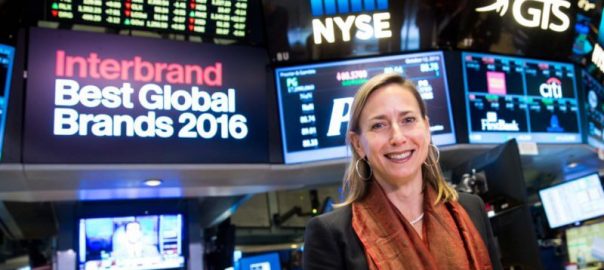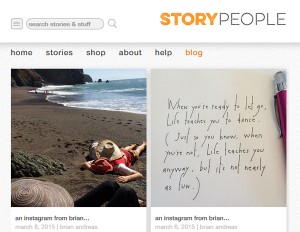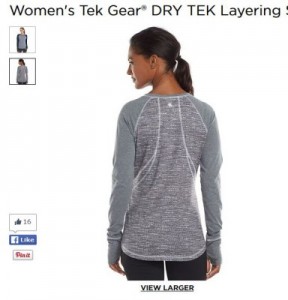Interbrand’s Andrea Sullivan on her rise to CMO and the people who inspired her along the way.

Fifteen years ago, Andrea Sullivan joined Interbrand as part of its client services division in New York City. During her tenure, she has worked in a variety of roles for the brand consultancy, from being one of the co-founders of its corporate citizenship practice to leading all of client services for North America.
After serving as Interbrand’s chief marketing officer for North American, she was named global CMO of the organization in June 2015.
“Interbrand is the largest of our kind in a smaller industry,” says Sullivan, “We have 24 different offices around the world, so hopefully, we are wherever our clients need us.” She says her role is to ensure the organization is creating thought leadership that fosters leadership conversations among industry CMOs.
In addition to her role as Interbrand’s CMO, she is also the co-founder of ONE HUNDRED. Part of the Omnicom agency, ONE HUNDRED is a consortium dedicated to the nonprofit sector, offering a number of services from advertising and branding to fundraising, research and analysis and strategic planning.
Today, Sullivan takes us back to her first job working the farmers market in Oregon, Wisconsin. She shares the lessons she learned during her first big career move, opening a New York City sales office for a small Wisconsin printing company, and why she’s looking forward to turning 50 this year.
My conversation with Andrea Sullivan begins with a quick overview of her role and company, but true to her calling, it doesn’t take long for Interbrand’s CMO to get to the meat of what a brand is — and the changes she has seen since her arrival in the industry.
“Fifteen years ago when I started, I think brand was considered something that was more of the veneer of an organization,” says Sullivan, “It was more the age of identity, where organizations were looking at how do they drive awareness.”
Sullivan says the role of the brand has changed, and now the brand is the product — it is the experience.
“I think, increasingly, as we’re seeing a world, frankly, in crisis right now, the majority of our work is around how does an organization really establish what its purpose is.”
Sullivan has witnessed what she calls a rise in a more purpose-led approach to building a brand, moving from the age of identity to one where we understand the brand as a business asset and something that can drive growth.
“It’s really important that customers feel they’re understood, and the brand is right for them,” says Sullivan.
Selling vegetables in Wisconsin
Sullivan’s notion — that the brand itself is an experience, and not just a driver to differentiate the business — can be linked to her very first job selling vegetables at the Madison, Wisconsin farmer’s market.
“I’m a farmer girl, and I worked at the Madison farmer’s market with a guy who I now just call Farmer Bill,” says Sullivan, “He taught me everything I know about marketing, but I didn’t realize he was going to play that role in my life.”
Sullivan says she constantly thinks about Farmer Bill because of the purity with which he approached his own business and the way he created an experience around selling vegetables.
“Farmer Bill was interesting in that he was the first to use hydroponic farming as a means to get his product to market before anybody else. He was the first to bring sugar snap peas — everybody else was a couple weeks behind, because, while the ground was frozen, he used these hoop-houses to grow things,” says Sullivan.
“He was smart. He knew if he got there first, the early adopters were willing to pay a premium — because everybody wants Spring a little before it arrives, right?”
Sullivan says the other thing Farmer Bill understood was a sense of abundance, and creating an experience.
“He would have piles of beets and peas — they weren’t organized in any kind of neat way, there were just big piles. He understood that abundance drives demand, and that he had to create a whole experience.”
According to Sullivan, he also had a knack for turning the farmer’s market into a social event.
“We would throw sugar snap peas out into the crowds, and they would either catch them or they would get bonked in the head with them. And then, they would come over to us, and we would offer to take picutres of them with the produce. People would come back each week because we were fun, and we were kind of goofy.”
From Wisconsin to the Big Apple
Sullivan took what she learned from Farmer Bill all the way through to her first career role, doing marketing for Perry Printing. Based in Waterloo, Wisconsin, the printing company tasked Sullivan with opening a New York City sales office.
Sullivan starts to laugh before telling me, “I was too young to know I should have been scared.”
She said she opened the office right across from Grand Central. She negotiated the real estate deal and did a number of things she says she probably shouldn’t have, but didn’t know better so early in her career.
“The interesting thing here is that my mother was also in printing.”
Sullivan says she and her mom were usually the only two females at the industry conferences they would attend. The CMO says the combination of being a female and having a really thick Midwest accent was an advantage.
“When I arrived in Manhattan and would cold-call people, everyone would agree to see me because they couldn’t understand — I was so other,” says Sullivan. She believes people would take her sales calls because they could not understand how she ended up in the industry she was in, and had to meet her in person.
“Initially, I was embarrassed about the fact that I came from the Midwest,” says Sullivan, “Now I celebrate where I am from, and certainly celebrate the way my parents brought me up.”
Sullivan says at the time, she just wanted to fit in.
“I think that’s something you learn over the years. In the early parts of your career, you’re constantly trying to figure out how do you fit in — and then, in the later parts of your career, you’re trying to figure out how do you stand out.”
One way Sullivan is standing out this year — or better, making a stand — is by telling everyone she can about her birthday.
“I”m going to be turning 50 this year, and, it’s funny. I work with a lot of incredible people here at Interbrand, but I notice that women especially are always complaining about the fact that they’re growing older — it doesn’t matter if they’re 20, they’re 30, they’re 40.”
Sullivan, on the other hand, says she is psyched to be turning 50 and is making a conscious effort to announce it more and more frequently.
“I want women to grow up realizing that life only gets better, especially if you’re generous and are constantly intellectually curious, and hopefully, trying to give back.”
Role models & mentors
When asked about about the people who have been generous with Sullivan during her career, her role models and mentors, the first person she mentions is her mother.
“My mom was an amazing women. She was a political activist in the ’60s, and she would bring us — I have a brother as well — she would bring us along with her.”
Sullivan says it was her mom who instilled her drive to “take to the streets” when she needed to make things happen, both in her life and her career.
“Not just when we need to, but when we have a point of view that we think needs to be shared — that’s something my mother has always really tried to underscore. The importance of taking initiative to fight for what you believe in, whether it’s for social causes, or frankly, for yourself.”

Sullivan, center, with her mother and daughter at the March for Women in D.C.
Sullivan says she has also been fortunate to have a lot of female leaders in her career who served as mentors. In 2008, she was part of an Omnicon Group initiative called G23 that was a think tank designed to help companies unlock the female economy.
“We had female CEOs — senior leadership from advertising agencies, PR, digital, branding — come together, and we would work with organizations like GM and McDonald’s,” says Sullivan, “Those people have been the best sort of role models in terms of business for me, and have also been some of my greatest friendships as well.”
Sullivan is also part of a small group of women — friends spread from London to Seattle — who meet up every year. She calls their meetups “moments of pause” where the women gather to inspire and support each other.
“We get together and try to work on some kind of goal or a challenge as individuals. We come together to help each other,” says Sullivan, “As the world gets faster, we need to be better at hitting the pause button. And that’s something that’s hard, particularly for women and mothers. But if we don’t do it, we’ll run the risk of losing our own happiness, and our own trajectory.”
As far as Sullivan’s career trajectory, she says her most memorable experiences so far have included her time as a professor in the Masters in Branding program at the School of Visual Arts and a UNICEF mission trip she did with Procter & Gamble in Indonesia.
“We went to very, very small, poor villages and helped them in inoculating school children for diseases that are unfathomable here. I was blown away by the sheer joy of these children, and, although they sleep on floors and don’t have enough to eat, they were so kind to me and generous.”
Sullivan was drawn to the faces of the mothers, and the connection she felt with them. She couldn’t speak their language, but she could relate to them as a mother.
“They’re building the houses, they’re doing all of the work — the farm work — while the husbands are inside drinking beer and playing cards for the most part,” says Sullivan, “It gave me a huge appreciation for what I have and for my role in the world, which I believe is to make sure that I’m connecting corporations to areas of need.”
Sullivan calls the trip an incredible moment for her.

Right now, Sullivan is focused on her work with the world’s top brands. Most recently, in addition to Interbrand’s well-known “Best Global Brands” rankings, the company released its second “Interbrand Breakthrough Brands” report, an initiative that involved collaboration with the New York Stock Exchange, Ready Set Rocket and Facebook.
Started last year, the report analyzes early to mid-stage companies and identifies the businesses best positioned to disrupt a wide variety of categories and sectors.
“We celebrate 50 different breakthrough brands and look at the different patterns that we’re seeing, and how those patterns can be relevant to not only little brands, or emerging brands, but equally big brands,” says Sullivan.
Sullivan also continues to teach her class, “Pitch Perfect,” at New York City’s School of Visual Arts. She says the optimism from her students when they are coming up with new business ideas gives her hope.
“I find that I can get a lot of inspiration from the generations that are going to be the future of our world.”
Marketing Land – Internet Marketing News, Strategies & Tips
(89)
Report Post












